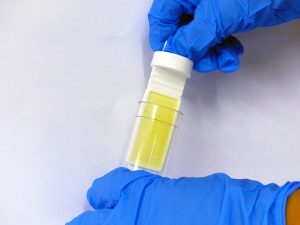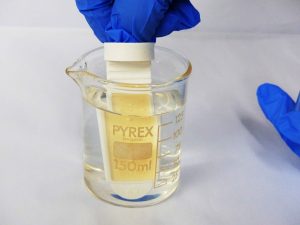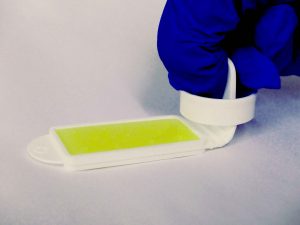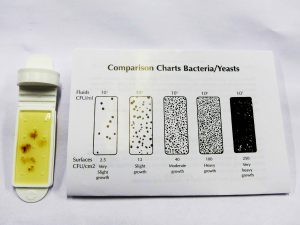How To Use A Dipslide
How To Use A Dipslide
2. Testing Fluids
Remove the slide from its tube, without touching the agar gel, immerse the gel part of the slide in the fluid to be tested for about 10 seconds. Alternatively, hold the slide under running liquid, or spray, so that both sides are covered.
Allow excess fluid to drain for a few seconds.
Replace in its tube, seal firmly, label as required and incubate.
OR 2. Testing Surfaces
Remove slide from its transparent container. Do not touch the agar culture gel. Holding the slide by the tab and the bottom of it, if required. Press one side of agar against the surface under test. The ribbed neck above the agar will bend to allow full contact.
Repeat with the second side on an area close to the first site.
Put the slide back into the tube, firmly seal, label and incubate.
3. Interpretation
After 48 hrs in the incubator, compare the dipslide to the chart provided in the box, reading the result from the closest matching image.
Fluid results are counted in “colony forming units” (CFU) per millilitre.
Surface results are in CXFU per square centimetre.
Number of bacteria and yeast are both compared to the top chart. Fungi (furry colonies) are compared to the lower chart in the leaflet.
Very high levels of contamination may lead to a complete overgrowth on the slide. If this is the case, comparing the DS to an unused example will show the difference.
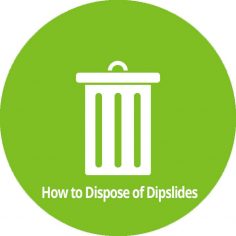
4. Disposa
Used dipslides should be incinerated, autoclaved or soaked in disinfectant for several hours before disposal.
Dipslide Fluid
Dipslide Surface
What is a dipslide?
A dip slide is used for bacteria testing. It specifically tests liquids for any micro-organisms, such as yeast and moulds. Furthermore, a dip slide test is commonly used for monitoring bacteria in water systems, such as cooling towers.
Where can I buy dipslides?
We have a range of Agar Type and Industry Use dipslides to choose from, including:
In addition to this, we also offer Microbiological Dipslide Incubators for Water Testing.

